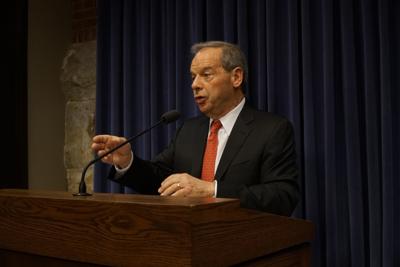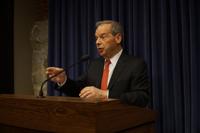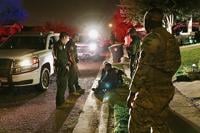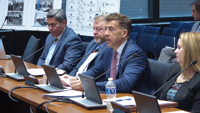Democrats stand to get more money for their legislative districts than Republicans under a proposed $45 billion infrastructure plan, a top state Democrat said.
A Republican involved in the late-night negotiations said talks with Gov. J.B. Pritzker's office resulted in more money for Republican districts, but said the spending was still lopsided at the end of the legislative session. Democrats have veto-proof majorities in both chambers.
Once the new capital spending plan signed into law earlier this month is finalized, districts represented by Illinois’ Democratic lawmakers will, on average, get more than districts represented by Republicans by what a high-ranking Democrat described as a two-to-one margin.
Senate President John Cullerton, D-Chicago, said the capital spending plan includes transportation projects such as roads and bridges along with “vertical infrastructure” spending that includes buildings.
Cullerton said that because it was Democrats who pushed through a $1 per pack cigarette tax hike, they should get more of the tax revenue for their districts, Politico Illinois Playbook's Shia Kapos reported and Cullerton's office confirmed.
While some Republicans voted for the capital plan, Democratic state Senators will reportedly get about $6 million for projects in their districts while Republican-represented areas would get about $3 million. Democratic state Representatives will get $3 million for their districts while Republican representatives will get about $1.5 million, according to the report.
The capital projects plan will be funded by hiking taxes on gasoline and higher fees for license renewals and bond issuances.
A number of itemized allocations were already listed in the legislation that passed both chambers and now awaits the governor’s signature. Some of those allocations are costly projects inside GOP-represented districts.
State Sen. Don DeWitte, R-St. Charles, was involved in the 11th-hour negotiations before the votes on infrastructure spending and the associated tax increases and bond authorizations needed to fund them. He said the GOP members and Pritzker’s office worked out a better balance than what Cullerton described.
“That last-minute discussion and negotiation that took place between our caucus and the governor’s office specifically got Republicans another million dollars in that process, so it actually ended up being a three-to-two split,” he said.
Pritzker’s office has some discretion on how that divide will be implemented, but the governor's office didn't respond to requests for comment on the spending disparity.
Republican Minority Leaders Bill Brady and Jim Durkin didn't respond to requests for comment Monday.
DeWitte said the uneven spending between Democratically-held districts and GOP-represented districts is "no surprise" considering that Republicans have far fewer members in both legislative chambers. However, DeWitte said Republicans were at the table to push for a better deal and business reforms.
"Legislators have two choices in this process; they can show up in their respective body and they can sit and punch the red button all they want, no more revenues, no more spending, no more capital bill, no nothing and run the risk of ending up with nothing," he said. "Or, they, like I chose to do, they can stick their nose in it, end up getting bloodied along the way, but hopefully coming up with enough out of it that they get that return on their tax dollars that they're paying into Springfield coming back into their districts."
State Rep. John Cabello, R-Machesney Park, said Republicans were “morally wrong” to support the increased spending in exchange for district projects.
“I don’t feel that it should come down to a bribe,” he said. “They’re bribing the taxpayers saying ‘OK, you elect more Democrats and they will get more money for the district.’ ”
State Sen. Martin Sandoval, D-Chicago, said that capital dollars shouldn't go to the districts of lawmakers who lacked the courage to vote for a gas tax hike.
“Maybe we can put a line in the capital bill where we bypass … Louisville, because that’s how he really feels about it,” Sandoval said in May, claiming a state Representative from Louisville put his number online for constituents to call to complain about proposed tax increases.









